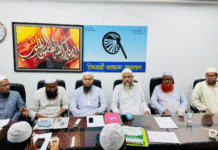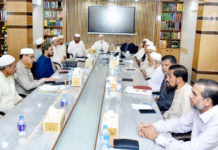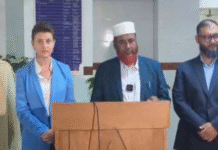
In an exclusive interview with the Dhaka Tribune‘s Nawaz Farhin Antara, recently expelled Jamaat-e-Islami leader and former central Majlis-e-Shura member Mojibur Rahman Monju discusses the mission, vision, and ideology of his newly announced party—Jana Aakangkhar Bangladesh (a Bangladesh based on people’s desire). He also explains the reason behind this initiative, along with other former reformist leaders of the rightwing party, and what resulted in his expulsion
Monju will be serving as the coordinator of the new party, which he claims will not be involved in religion-based politics. Monju also served as a president of the Bangladesh Islami Chhatra Shibir—the student wing of Jamaat.
Why did you decide to form Jana Aakangkhar Bangladesh? What is the party’s main aim?
This is a completely new initiative, although we have not officially launched the party yet. After leaving Jamaat-e-Islami, I became a non-partisan politician. I do not adhere to any one particular ideology.
Our party will not be based on any one political theory or doctrine. Jana Aakangkhar Bangladesh will fight for human rights. We want to transform Bangladesh into a welfare state. I want to attract people to my party who believe in these core principles.
Why should people support your platform when there are already over three dozen active political parties in Bangladesh?
Currently, the party in power, along with all other major opposition parties, are seeking to further their own interests only. However, our party will only have members who intend to ensure everybody’s rights—rights that are currently absent in Bangladesh.
Some former Jamaat-e-Islami leaders are also involved with this initiative. Is Jana Aakangkhar Bangladesh just a new version of Jamaat?
It is a complete misconception that Jana Aakangkhar Bangladesh is an off-shoot of the Jamaat-e-Islami. Only two of our members, including me, were formerly involved with Jamaat’s Dhaka metropolitan unit policymaking body—the Majlis-e-Shura.
Also Read – Who is Mojibur Rahman Monju?
You have to realize that even Jamaat-e-Islami is condemning our initiative. This is not a religious party.
We are currently working on writing up a constitution for the party, with a committee of 16 core members. We have a few professors, lawyers, political experts, students, businessmen—including former members of the Bangladesh Nationalist Party (BNP), Awami League, Jatiya Party, and many others.
Will this be an inclusive party representing people from all walks of life?
Yes, every member will be chosen based on their belief in freedom of thought and expression. We want to support freedom and rights, and strongly condemn this autocratic system Bangladesh has been gripped by. The number of senior leaders from Jamaat-e-Islami is very low in Jana Aakangkhar Bangladesh. This will be a party inclusive of all.
What will be the ideology of the people supporting your initiative?
Since our organization is open to all, people supporting different political parties and with various ideologies are contacting us. Now we have members in 40 districts. Very soon, we will spread all over Bangladesh, with district and upazila committees.
We cannot divulge the names of many of our notable leaders, in order to maintain confidentiality. However, I can say that we have some former district-level senior Awami League and BNP leaders.
What is your party’s stance on the Liberation War and war crimes trials?
I want to say again that our party is not affiliated with Jamaat in any way. Although I was a former member of that party, I was also expelled from it, for agreeing with Barrister Abdur Razzaq on his three demands. I too pushed for party reformation, supported war crimes trials, and proposed that Jamaat-e-Islami apologize to the people of Bangladesh for the anti-independence role it played during the Liberation War of 1971.
I disagreed on various organizational decisions. Party leaders took it as an offense against the organization and expelled me from the party on February 15 this year.
I wanted to reform the party’s structure, ideology and strategy. Due to changing times and circumstances, I demanded changes to our political doctrine. But Jamaat-e-Islami does not want to change, even though Islamic parties elsewhere in the world have enacted major intra-party reforms to keep up with the pace of modern politics.
Will the new platform be in favour of the war crimes trials?
Jana Aakangkhar Bangladesh is in favour of the trials, since we all agree that those were crimes against humanity.
Source: Dhaka Tribune.









